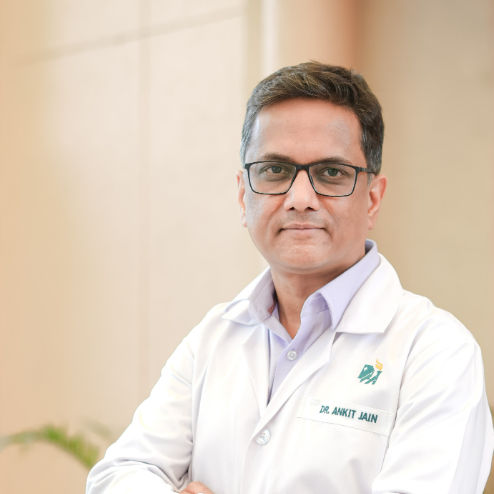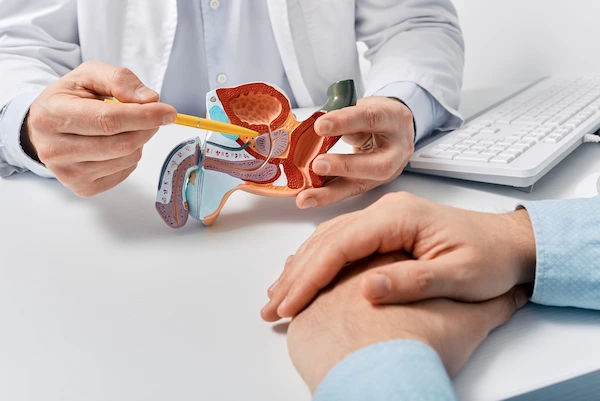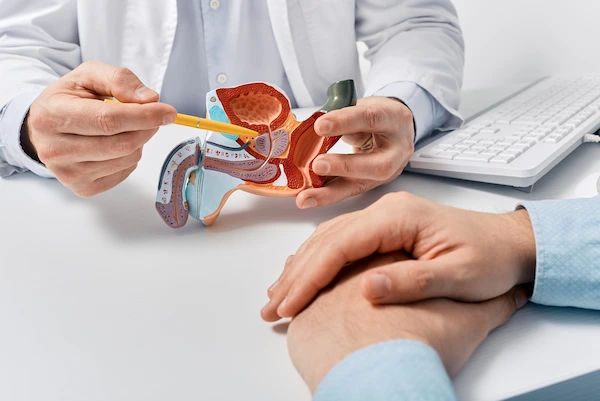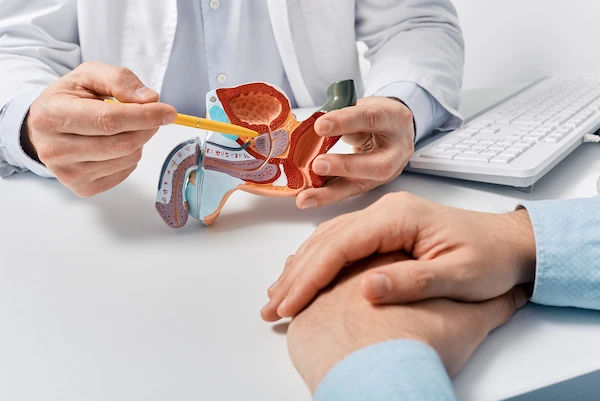Reasons for Prostate Cancer in Men
Explore the key causes and risk factors of prostate cancer in men, including age, genetics, diet, and hormone levels. Learn how lifestyle changes and early screening can help reduce risk.

Written by Dr. Dhankecha Mayank Dineshbhai
Reviewed by Dr. M L Ezhilarasan MBBS
Last updated on 21st Aug, 2025

Prostate cancer is one of the most common cancers affecting men, particularly as they age. While the exact cause of prostate cancer is not fully understood, several factors can increase a man’s risk of developing this condition. Being aware of these risk factors can help in early detection and prevention.
In this article, we’ll discuss the possible reasons behind prostate cancer, how it affects men’s health, and what steps you can take to reduce your risk.
What Is Prostate Cancer?
The prostate is a small gland in men that produces seminal fluid. Prostate cancer occurs when cells in this gland grow uncontrollably, forming a tumour. While some prostate cancers grow slowly and may not cause serious harm, others can be aggressive and spread quickly.
Early detection is crucial for effective treatment, which is why understanding the risk factors is important.
Key Reasons and Risk Factors for Prostate Cancer
1. Age
- Prostate cancer is rare in men under 40, but the risk increases significantly after age 50. About 6 in 10 cases are diagnosed in men over 65.
2. Family History and Genetics
- Having a father or brother with prostate cancer doubles your risk.
- Inherited gene mutations (such as BRCA1 or BRCA2) may also increase susceptibility.
3. Race and Ethnicity
- Black men have a higher risk of developing prostate cancer and are more likely to have aggressive forms.
- The reasons for this disparity are still being studied but may include genetic and environmental factors.
4. Diet and Lifestyle
- High-fat diets (especially red meat and dairy) may contribute to prostate cancer risk.
- Obesity is linked to a higher chance of aggressive prostate cancer.
- Low intake of fruits and vegetables may also play a role.
Consult Top Specialists
5. Hormonal Factors
- Testosterone levels may influence prostate cancer development, as the prostate depends on male hormones for growth.
- Some studies suggest that men with higher levels of insulin-like growth factor-1 (IGF-1) may have an increased risk.
6. Environmental and Occupational Exposures
- Exposure to certain chemicals (like Agent Orange or cadmium) has been linked to a higher prostate cancer risk.
- Firefighters and workers in industries with heavy chemical exposure may have an elevated risk.
7. Chronic Inflammation
- Some research suggests that long-term inflammation of the prostate (prostatitis) may contribute to cancer development, though more studies are needed.
How Does Prostate Cancer Affect Health?
Prostate cancer may not cause symptoms in its early stages, but as it progresses, men may experience:
- Frequent urination (especially at night)
- Weak or interrupted urine flow
- Blood in urine or semen
- Pain in the pelvis, back, or hips
- Erectile dysfunction
If the cancer spreads (metastasizes), it can affect bones and other organs, leading to more severe complications.
How Can You Lower Your Risk?
While some risk factors (like age and genetics) can’t be changed, you can take steps to reduce your risk:
1. Eat a Healthy Diet
- Increase fruits and vegetables (especially tomatoes, broccoli, and green tea).
- Choose healthy fats (like olive oil, nuts, and fish) over saturated fats.
- Limit processed meats and dairy.
2. Stay Physically Active
- Regular exercise helps maintain a healthy weight and may lower prostate cancer risk.
3. Get Regular Screenings
- PSA (Prostate-Specific Antigen) test – A blood test that can detect early signs of prostate cancer.
- Digital Rectal Exam (DRE) – A doctor checks the prostate for abnormalities.
Men over 50 (or 45 if at high risk) should discuss screening with their doctor.
4. Avoid Smoking and Limit Alcohol
- Both smoking and excessive alcohol consumption can increase cancer risks.
5. Manage Stress and Sleep Well
- Chronic stress and poor sleep may weaken the immune system, potentially affecting cancer risk.
When to See a Doctor?
If you experience urinary problems, unexplained pain, or have a family history of prostate cancer, consult a doctor. Early detection can make treatment more effective.
If you’re due for a check-up, you can book a consultation or schedule a PSA test through Apollo 24|7 for convenient and expert care.
Final Thoughts
Prostate cancer is influenced by multiple factors, some within your control and others not. By understanding these risks and making healthy lifestyle choices, you can take proactive steps toward prevention.
If you have concerns about prostate health, don’t hesitate to speak with a healthcare provider. Early awareness and action can make all the difference.
Consult Top Specialists
Consult Top Specialists

Dr. Rupam Manna
Radiation Specialist Oncologist
4 Years • MBBS MD(RADIO THERAPY)
Barasat
Diab-Eat-Ease, Barasat

Dr.sanchayan Mandal
Oncologist
17 Years • MBBS, DrNB( MEDICAL ONCOLOGY), DNB (RADIOTHERAPY),ECMO. PDCR. ASCO
Kolkata
Dr. Sanchayan Mandal Oncology Clinic, Kolkata

Dr Gowshikk Rajkumar
Oncologist
10 Years • MBBS, DMRT, DNB in Radiation oncology
Bengaluru
Apollo Clinic, JP nagar, Bengaluru

Dr. Harsh J Shah
Surgical Oncologist
15 Years • MS, MCh (GI), DrNB (GI)
Ahmedabad
Apollo Hospitals Gandhinagar, Ahmedabad

Dr Ankit Jain
Medical Oncologist
20 Years • MBBS, (MAMC Delhi), MRCP Oncology (London), MRCP Medicine (London), MSC Oncology(UK) CCT(UK)
Delhi
Apollo Hospitals Indraprastha, Delhi
(25+ Patients)
Consult Top Specialists

Dr. Rupam Manna
Radiation Specialist Oncologist
4 Years • MBBS MD(RADIO THERAPY)
Barasat
Diab-Eat-Ease, Barasat

Dr.sanchayan Mandal
Oncologist
17 Years • MBBS, DrNB( MEDICAL ONCOLOGY), DNB (RADIOTHERAPY),ECMO. PDCR. ASCO
Kolkata
Dr. Sanchayan Mandal Oncology Clinic, Kolkata

Dr Gowshikk Rajkumar
Oncologist
10 Years • MBBS, DMRT, DNB in Radiation oncology
Bengaluru
Apollo Clinic, JP nagar, Bengaluru

Dr. Harsh J Shah
Surgical Oncologist
15 Years • MS, MCh (GI), DrNB (GI)
Ahmedabad
Apollo Hospitals Gandhinagar, Ahmedabad

Dr Ankit Jain
Medical Oncologist
20 Years • MBBS, (MAMC Delhi), MRCP Oncology (London), MRCP Medicine (London), MSC Oncology(UK) CCT(UK)
Delhi
Apollo Hospitals Indraprastha, Delhi
(25+ Patients)




